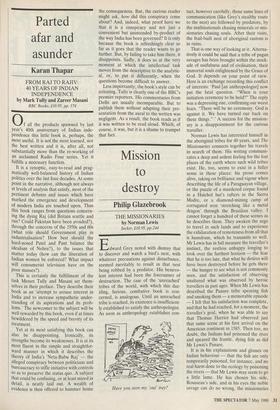Parted afar and asunder
Karan Thapar
FROM RAJ TO RAJIV: 40 YEARS OF INDIAN INDEPENDENCE by Mark Tully and Zareer Masani
BBC Books, £10.95, pp. 174
0 f all the products spawned by last Year's 40th anniversary of Indian inde- pendence this little book is, perhaps, the most useful. It is not the most learned, nor the best written and it is, after all, not substantially more than the re-working of an acclaimed Radio Four series. Yet it fulfills a necessary function.
It is a synoptic, easy-to-read and prag- matically well-balanced history of Indian Politics over the last four decades. At some point in the narrative, although not always at levels of analysis that satisfy, most of the pertinent debates and issues which have marked the emergence and development of modern India are touched upon. Thus this book ranges from questions concern- ing the dying Raj (did Britain scuttle and run? Could Pakistan have been avoided?), through the concerns of the 1950s and 60s (what role should Government play in industrialisation? How best should the hard-nosed Patel and Pant balance the idealism of Nehru?), to the issues that matter today (how can the liberation of Indian women be enforced? What impact will consumerist television have on the poor masses?).
This is certainly the fulfillment of the task Messrs Tully and Masani set them- selves in their preface. They describe their book as an 'attempt to arouse interest in India and to increase sympathetic under- standing of its aspirations and its prob- lems.' The newcomer to the subject will be well rewarded by this book, even if at times bewildered by the speed and brevity of its treatment.
Yet at its most satisfying this book can also be disappointing. Ironically, its strengths become its weaknesses. It is at its most fluent in the simple and straightfor- ward manner in which it describes the theory of India's `Neta-Babu Raj' — the alleged conspiracy between politicians and bureaucracy to stifle initiative with controls so as to preserve the status quo. A subject that could be confusing, or at least mired in detail, is neatly laid out. A wealth of evidence is then offered to hammer home the consequences. But, the curious reader might ask, how did this conspiracy come about? And, indeed, what proof have we that it is a conspiracy and not just a convenient but unintended by-product of the way India has been governed? It is only because the book is refreshingly clear so far as it goes that the reader wants to go further. But, by failing to take him there, it disappoints. Sadly, it does so at the very moment at which the intellectual task moves from the descriptive to the analytic- al, or, to put it differently, when the questions become difficult to answer.
Less importantly, the book's style can be irritating. Tully is clearly one of the BBC's premier reporters. His commentaries from Delhi are usually incomparable. But to publish them without adapting their pre- sentation from the aural to the written was negligent. As a result, the book reads as if it was written to be read aloud. Which, of course, it was, but it is a shame to trumpet that fact.






















































 Previous page
Previous page